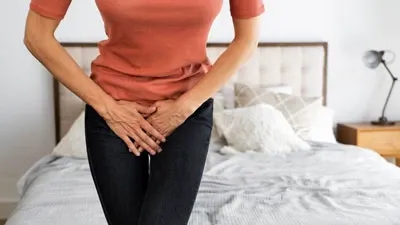This type of pain isn't talked about much, but it can be very uncomfortable. Understanding what causes this pain and whether it's normal or indicative of an underlying issue is essential.
Vulvar pain during menstruation, while not entirely unusual, is not something that everyone experiences. For some women, mild discomfort or sensitivity in the vulvar region can occur due to hormonal changes, irritation from menstrual products, or swelling related to menstruation. However, if the pain is severe, persistent, or accompanied by other symptoms, it may signal an underlying health issue that requires attention. In general, mild vulvar discomfort during menstruation is normal, but understanding when to worry is important to ensure any underlying conditions are diagnosed and treated early.
To understand vulvar pain during periods, OnlyMyHealth interacted with
Dr Sadhna Singhal Vishnoi, Senior Consultant - Obstetrics and Gynaecology, Cloudnine Group of Hospitals, New Delhi.
Why You Might Experience Vulvar Pain During Your Period
The vulva is the external part of the female genitalia, including the labia, clitoris, and the opening to the vagina. "Hormonal changes during the menstrual cycle can affect blood flow, increase sensitivity, or cause swelling in this area. Some women may also experience irritation from sanitary products such as pads or tampons, leading to discomfort," Dr Singhal explained.
Adding further, she said, "During your period, estrogen and progesterone levels fluctuate, which can cause a variety of symptoms. For some women, this can include vulvar pain or discomfort, especially if the tissues around the vulva become more sensitive or irritated." Pads and other menstrual products may cause friction, especially if they are worn for long periods or if the material isn't breathable, potentially leading to irritation or skin breakdown in sensitive areas.
What Causes Vulvar Pain?
Several potential conditions can cause vulvar pain during your period, including:
Vulvodynia: Chronic vulvar pain with no known cause.
Vaginal Infections: Including yeast infections or bacterial vaginosis.
Sexually Transmitted Infections (STIs): Such as herpes or chlamydia, which can cause sores and discomfort.
Endometriosis: Where uterine-like tissue grows outside the uterus, causing pain during menstruation and possibly throughout the cycle.
Pelvic Inflammatory Disease (PID): A serious infection of the reproductive organs.
When is Vulvar Pain Normal?
Mild vulvar discomfort, such as slight irritation or tenderness, can be considered normal during menstruation. It's often due to the reasons mentioned above-hormonal changes or irritation from menstrual products. According to Dr Singhal, this kind of pain typically resolves as the menstrual cycle progresses or after switching to different products, such as menstrual cups or organic cotton pads, which may be less irritating for some women.
Other factors like tight clothing, poor hygiene, or prolonged use of pads and tampons can also contribute to mild vulvar discomfort. Ensuring proper hygiene and wearing loose, breathable clothing can reduce the risk of irritation.
When to Worry About Vulvar Pain
While mild discomfort may not be a cause for concern, more severe or persistent vulvar pain is not typical and could indicate a more serious issue. If you experience any of the following, it's important to consult a healthcare professional:
Severe Pain
If the pain in the vulvar region is intense or sharp, Dr Singhal says that it may be a sign of an underlying condition such as vulvodynia (chronic vulvar pain) or pelvic inflammatory disease (PID), a serious infection of the reproductive organs. Endometriosis, a condition where uterine tissue grows outside the uterus, can also cause pain in this region.
Pain Extending Beyond the Menstrual Period
Vulvar pain that persists before or after your period may point to conditions like vulvovaginitis, vaginal infections, or skin conditions such as lichen sclerosus, a rare condition that causes thin, patchy white skin in the genital area. Endometriosis or other pelvic floor disorders can also cause ongoing pain.
Pain with Other Symptoms
If vulvar pain is accompanied by other symptoms such as itching, burning, unusual discharge, or sores, this may indicate an infection. "Yeast infections, bacterial vaginosis, or sexually transmitted infections (STIs) like herpes can cause vulvar pain and discomfort along with these other symptoms," Dr Singhal said. These conditions require prompt treatment to prevent complications.
Pain During Intercourse
"Pain in the vulvar region that worsens during or after intercourse may be a sign of conditions like vaginismus (involuntary contraction of vaginal muscles), endometriosis, or an infection," Dr Singhal explained. If pain during sex becomes persistent or debilitating, it is essential to seek medical advice.
Unexplained Swelling or Redness
Unusual swelling, redness, or sores in the vulvar region could indicate dermatitis, contact allergies, or infections that need medical intervention. "Allergic reactions to materials in menstrual products, scented soaps, or detergents can also lead to vulvar discomfort," Dr Singhal notes.
When to See a Doctor
If vulvar pain interferes with your daily life, it's crucial to consult a healthcare professional. Signs that indicate you should seek medical attention include:
- Severe or persistent pain that doesn't improve with over-the-counter pain relievers.
- Pain accompanied by abnormal discharge, itching, or sores, which may indicate an infection.
- Pain that persists outside your menstrual period or continues after using home treatments or switching menstrual products.
